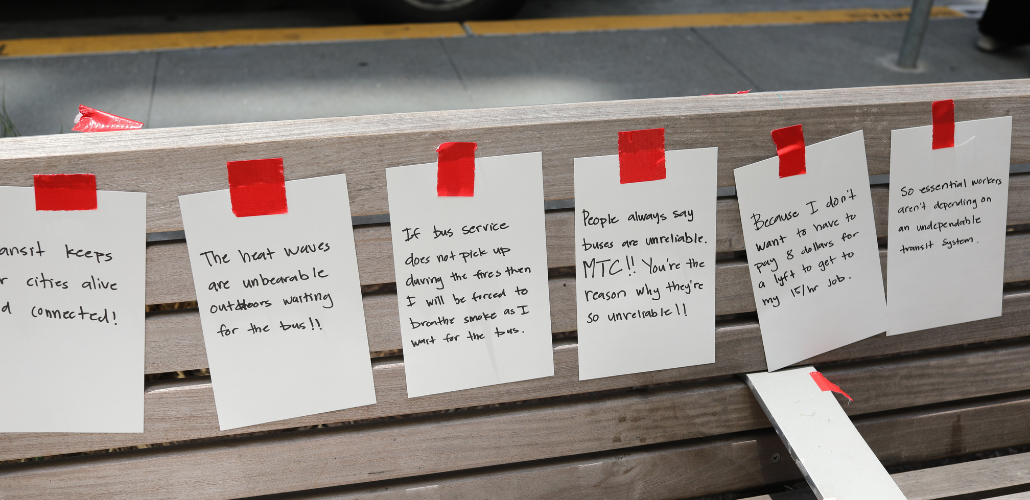Bay Area Transit Workers and Riders Demand to Unlock $1.7 Billion Already Earmarked for Jobs and Bus Service

This money offers the chance to restore transit jobs and service decimated by the pandemic. But it cannot be spent until an obscure, unelected board says so. Photo: Zac Goldstein
Federal help is on the way, we were told months ago—but where’s the money?
When President Biden signed the American Rescue Plan Act on March 11, one commentary called it a “money hose… [aimed] at the raging wildfire of poverty and desperation incinerating the poor and middle class.”
But, as Biden added just days later, it was “one thing to pass” the bill, and “quite another to implement it… to make sure the relief arrives quickly” to struggling communities.
VIDEO: Rally and March
Check out video of the May 6 rally and march here.
One hundred transit workers and riders rallied and marched to the San Francisco headquarters of the Bay Area’s regional transportation funding agency on May 6.
Their demand: to move $1.7 billion in federal rescue funds—which were intended to create union transit jobs and restore cut service—off the shelf and into the community.
WHILE MTC STALLS, RESCUE FUNDS SIT IDLE
Across the U.S., billions in federal funds are sitting idle while state and local agencies decide how to spend them.
One example is $46 billion in emergency renter aid. The federal government made more than half of that money available in December, with the rest following in the ARP Act. Four months later, the New York Times reported, “only a small portion has reached landlords and tenants, and in many places it is impossible even to file an application.”
The $1.7 billion that transit workers and riders are calling attention to is the San Francisco Bay Area’s share of $30 billion in relief for public transportation included in the ARP Act.
This money offers the chance to restore transit jobs and service decimated by the pandemic. But it cannot be spent until an obscure, unelected board says so.
That board, the Metropolitan Transportation Commission, decided—behind closed doors, in multiple meetings with transit agency management—to postpone any public discussion of the ARP funds for two months, and to drag out the process of distributing those funds among the region’s two dozen transit agencies until the end of July.
Unlike rent relief, which requires cities and states to set up systems and processes, the task before MTC is quite simple: it only needs to adopt a resolution authorizing each of the Bay Area’s transit agencies to receive a specific dollar amount. A year ago, when similar transit funds were included in the CARES Act, MTC was able to do that in just two months.
Over the course of the pandemic, transit locals and riders in the area have grown together in battles with their common foe, the MTC. They fought shoulder to shoulder last year to win Covid safety measures and stop layoffs, and this year to resume fareless bus rides.
‘TODAY IS THAT RAINY DAY’
Left out of MTC’s closed-door discussions with management, leaders of Bay Area labor councils and transit union locals met with the MTC director on May 4. “Our buses are still overcrowded, said Roger Marenco, president of Transport Workers Local 250A. “We need more service, and we have the operators ready to drive.”
One reason time is of the essence: “Transit agencies right now are in the process of adopting budgets for the fiscal year that starts on July 1,” said John Courtney, president of Transit (ATU) Local 265. Because of the delay, those budgets don’t include ARP funding.
He asked whether MTC would give the transit agencies even an estimate of their share of the federal funds, for budgeting purposes. The answer was no.

SUPPORT LABOR NOTES
BECOME A MONTHLY DONOR
Give $10 a month or more and get our "Fight the Boss, Build the Union" T-shirt.
“We fought to get this money so our workers wouldn’t get laid off,” said Liz Ortega, secretary-treasurer of the Alameda Labor Council. “Where is the accountability?”
Two days later, transit workers from five ATU locals and one TWU local were joined by labor council leaders and riders at the regional transit terminal in San Francisco. They unfurled a 28-foot banner: “Hey, MTC! Unlock our Money. Stop Starving Our Transit.” Ortega told MTC: “We don’t want your thank you. We want our money.”
San Francisco transit rider Regina Islas accused MTC of “hoarding the $1.7 billion for a rainy day.
“Well, MTC,” she said, “I brought your weather report: Today is that rainy day!”
POWER IN RIDER-DRIVER UNITY
The crowd marched to the MTC headquarters, chanting “Whose money? Our money!”

The building was empty, of course. While transit workers and riders have been on the front lines of the pandemic day in and day out, the technocrats at MTC have been working safely from home.
Nonetheless, participants plastered posters on the building with their answers to the question, “Why do we need to return to full service NOW?” One reason: because thousands of riders are being “passed up” every day by the reduced number of buses in service.
Courtney said afterwards that ATU members felt not only appreciation from riders that day, but also power. “It was very important that we had the folks who actually ride the bus to explain what the pass-ups mean to them and how it’s affecting their lives,” he said. “It means a lot that the community has our back.”
“We’re building real power here,” said event organizer Nathan Swedlow, a member of the East Bay Democratic Socialists of America’s People’s Transit Alliance. “It’s the very people that are most affected by these austerity budgets—the transit riders and the transit workers—that made this whole rally happen.”
Richard Marcantonio is managing attorney at Public Advocates Inc., a nonprofit civil rights and economic justice advocacy organization. He is a co-founder of the Voices for Public Transportation Coalition.




